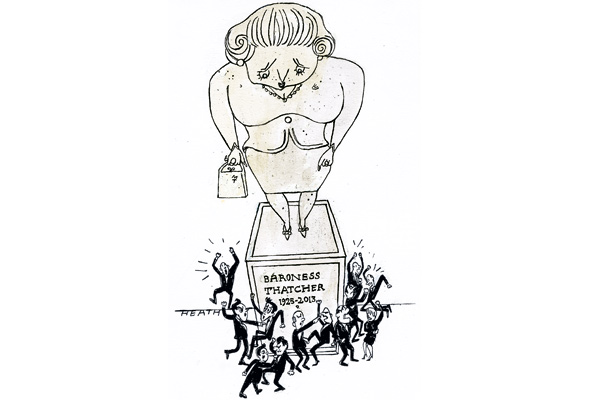Home
Margaret Thatcher, the prime minister from 1979 to 1990, died aged 87. She had suffered a stroke while reading in her room at the Ritz hotel, where she had been staying since being discharged from hospital at the end of 2012 after a minor operation. David Cameron, the Prime Minister, cancelled talks in Paris with President François Hollande and returned to Britain. News broadcasts and newspapers were dominated by coverage of her political career. Seven policemen were injured when perhaps 200 people gathered at Easton, in Bristol, celebrating the death and setting fire to dustbins after dark. Both Houses of Parliament were recalled for a day in tribute to Lady Thatcher, a life peeress since 1992. On 17 April she is to be accorded, not a state funeral, but one with military honours, of the kind given to Diana, Princes of Wales, with a procession from St Clement Danes to St Paul’s cathedral, to be followed by a private cremation. The Queen is to attend the service at St Paul’s.
Sir James Crosby, the former chief executive of HBOS, asked for his knighthood to be removed in light of the Banking Standards Commission report’s description of him as the ‘architect’ of the strategy that led to the bank’s downfall. The British Library was given legal power by a statutory instrument to store every British website and exchanges on Facebook and Twitter. Paris Brown, aged 17, resigned as a so-called youth police and crime commissioner a week after being appointed by Ann Barnes, the real police and crime commissioner of Kent, when tweets surfaced from the past, such as: ‘Everyone on Made In Chelsea looks like a f—ing fag.’ Kent police investigated whether any offence had been committed. On Dartmoor, 100 firemen fought 1,500 acres of wild fires.
Children’s heart surgery resumed at Leeds General Infirmary after Sir Bruce Keogh, the medical director of NHS England, who had suspended operations last month, declared that he had made his decision because ‘Leeds had not submitted good data’. Cases of measles rose to 620 in the Swansea area. The Department for Environment, Food and Rural Affairs refused to ban neonicotinoid pesticides blamed by some for killing bees. No horses died in the Grand National, won by Auroras Encore at 66-1, ridden by Ryan Mania, who had a heavy fall the next day at Hexham and spent two days in hospital. A power station at Beckton in east London is to burn ‘fatbergs’ that congeal in London’s sewers.
Abroad
North Korea warned foreigners in South Korea to put in place measures for evacuation in case of war. ‘The situation on the Korean peninsula is heading for a thermonuclear war,’ said Pyongyang’s Asia-Pacific Peace Committee. Japan, while doubting the veracity of any statement by North Korea, deployed defensive anti-missile batteries around Tokyo. The Bank of Japan pursued vigorous quantitative easing to double the supply of yen in the market and drive down its value to boost exports. A red lotus-painted bowl from the Kangxi period (1662–1722) fetched £6.2 million in an auction in Hong Kong.
Mario Monti, still the ruler of Italy, following its failure to form a government since February’s general election, issued a decree that promised payment of €40 billion of debts over the next year by the public administration to private contractors. The prime minister of Portugal said that to meet its bailout obligations, the government would have to make cuts in health, education and social security, after a court ruled that cuts to public-sector pay and pensions were unconstitutional. President Hollande of France gave all members of his Socialist party government a week to publish full details of their wealth after Jérôme Cahuzac, the budget minister until mid-March, admitted that he had lied about a Swiss account he had held for 20 years.
The British Foreign Office warned of a terrorist attack on Mogadishu, the Somali capital, against which al-Shabaab, the Islamist terrorists, remained active. A Nato air strike killed 11 children and a woman in the eastern Kunar province of Afghanistan. Shia Muslims in the town of Qatif, in Saudi Arabia’s eastern oil-producing province, rallied in protest at the arrest of a sheikh in connection with alleged spying by Iran. Iran began mining uranium at two sites and suffered an earthquake of 6.3 magnitude, destroying a dozen villages near its sole nuclear power station. Indonesia considered a law to prohibit black magic. CSH





Comments